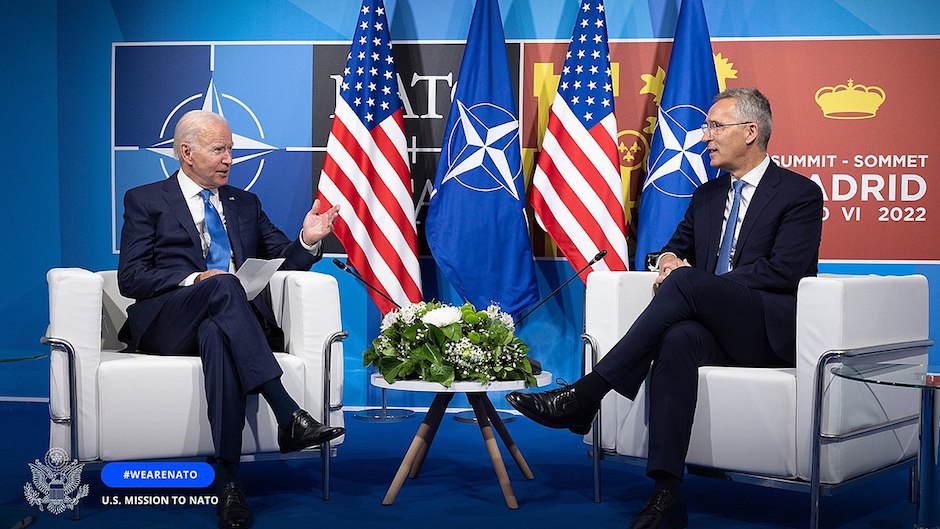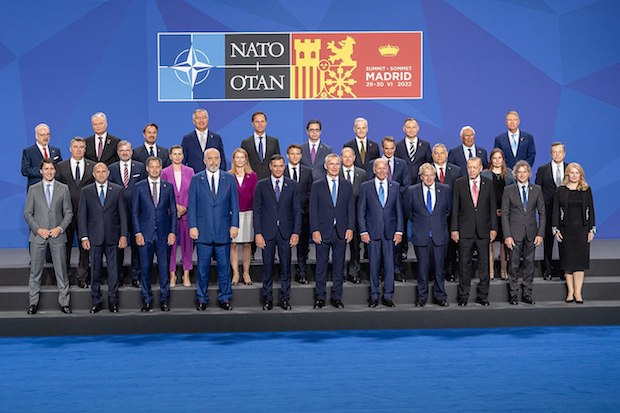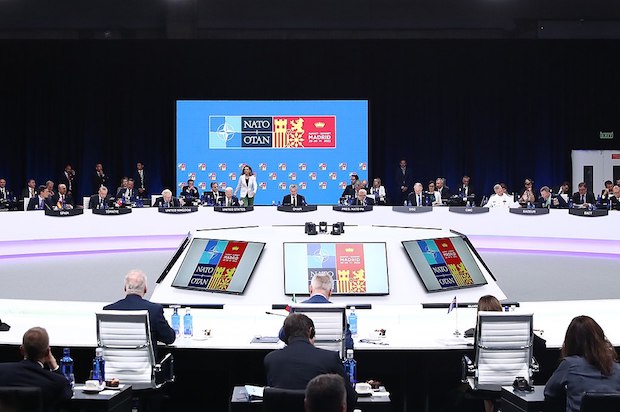“NATO is an instrument of the ‘American Peace’ in Europe”
The organisation is flexing its muscles after the Madrid summit and announces the expansion of its borders and greater militarisation. Voices from the Evangelical and Protestant spheres analyse the new scenario.
Protestante Digital · MADRID · 11 JULY 2022 · 09:40 CET

The NATO summit in Madrid has concluded with a clear ideas: Western Europe is relying on and increasing its dependence on the United States.
The US comes out of the meeting particularly reinforced, with Russia described as a “direct threat” and China as a “systemic challenge”.
“NATO was and is an instrument of the 'American Peace', a euphemism for American imperialism that has been favourable to Europe”, says Berend Coster, Dutch professor of History of Christianity and Ethics at the IBSTE International School of Theology and pastor of the Christian Reformed Church of Mataró (Spain).
He recalls that “in 1949 the Americans organised the defence of the part of Europe they controlled through NATO. It did not subject European nations using violence but it was rather a voluntary subjection of Western Europe to the best option for maintaining its (relative) autonomy with the best perspectives for the restoration of the continent after World War II”.
“The entry of the Federal Republic of Germany in 1955 is the best illustration of this thesis, as well as the entry of the Eastern European countries since 1990”, adds Coster.
The 'exhibition' in Madrid's recent summit of NATO's political representatives, their companions and a whole entourage of advisers and agents (the paradox of the “security secured'') seems to convey much more than a defence model, but a whole idea of what it means to live in a certain part of the planet.
After announcing the deployment of up to 300,000 soldiers on European territory (there are now 40,000), the media showed images of a dinner in one of the halls of the famous Prado fine arts Museum in the Spanish capital city. “We cannot rule out an attack on the sovereignty and territorial integrity of the allies” was one of the messages sent to journalists before a photo session all together and smiling.
A relaunched NATO
“NATO was established as a defense system against Soviet aggression, mainly dominated by the US and following US interests in Europe”, explains the the director of the Department of Public Engagement and global director of the Peace and Reconciliation Network (PRN) of the World Evangelical Alliance, Johannes Reimer.
Professor Coster, who always speaks of US international influence in terms of “imperialism", says that “after a time of hesitation because of many mistakes, such as Vietnam, Afghanistan or Iraq”, he is now “grateful for the presence of the Americans in Europe to lead the defence against Russia's re-armed imperialism. It turns out that post-communist Russia is as aggressive or more aggressive than communist Russia”.
According to the Dutch theologian, “the NATO had been neglected. After 1990 it was irrelevant, assuming there was no danger of war on its borders. I don't know if it would have been better to maintain a full and expensive weaponry for 25 years, until the annexation of Crimea”.

“Now, all those who had warned against Russia were right, but we have only realised this after the end of February. In any case, dissuasion is better than war”.
The President of the US justifies the rearmament in Europe because of the “the security crisis” the continent is experiencing, which he describes as “the greatest since World War II”,.
Biden pointed out that in Madrid the NATO was undertaking “the biggest overhaul of our collective defence since the end of the Cold War”.
Christian democracies and NATO
Many recognise the background of Christian values in the formation of many Western democracies and their constitutions, so the question is whether or not NATO fits with those same foundations.
For the Anabaptists, Mennonites and Brethren in Christ of Spain (AMyHCE), “NATO is clearly an apparatus of power and violence, which contradicts the values established by the Master and aligns itself with the values of the world”.
“Sadly, in the face of any threat to their security, real or not, human beings normally react by arming themselves, prehistorically with sticks and stones and today with very sophisticated weaponry. Based on this principle, we understand that militarisation is the next logical, though not desired, step, because the information and media are in favour of it, since the business of buying and selling arms produces enormous profits for manufacturers and intermediaries”, underlines the AMyHCE.
According to this group, “mainstream Christian traditions have always preferred to ignore the political programme of Jesus, which was non-violent resistance to evil in all its forms”.
“We believe that the life of Jesus and his teachings show us his attempt to transmit new values to his followers, among which are 'non-violence' and authority based on service and not on power”, AMyHCE stresses.
Ecnomic interests for super-powers
Regarding US interests in Europe through NATO, Johannes Reimer, who is an Eastern Europe expert, considers that “those interests are beyond Christian values, often economic in nature and always underlining the super-power role of the US. This is imperialist rather than Christian”.
Coster agrees. “Americans have defended, and still do, their world position, their culture, their economy and their political system as a providential story. As a European I say that for better and for worse, so far, and at least for Europe, American imperialism has been the most generous in history”.
Rampant militarisation
One of the most obvious consequences of the NATO summit in Madrid is the increased militarisation of member states.
Its Secretary General, Jens Stoltenberg, said NATO had to position itself “in a more competitive and dangerous world. We agree a fundamental shift to our deterrence and defence with more forward deployed combat formations”.

For the Mennonites and Anabaptists, this discourse “is the narrative that will make an impression on the population and will justify Europe's huge spending on weaponry in the coming years. But history tells us that an armament race, far from making us stronger, weakens us and puts us all on the brink of the abyss”.
Johannes Reimer agrees that “the decisions of Madrid will bust militarization in the world and sharpen the conflict with Russia, but even more important with China. The West needs less NATO, especially a NATO constantly expending towards the East”.
This remilitarisation, Coster says, is above all “a consequence of Russian aggression”. While he considers the aggression as “worrisome", he also feels the same way about NATO's announcement of rearmament.
“Right now it is the lesser evil option to protect ourselves because we know that Russia is irresponsibly taking advantage of the weakness of its neighbours. The plan Putin has unveiled is to restore the empire of the tsars and Stalin, which will mean the reconquest and subjugation of several surrounding countries”, explains the IBSTE professor.
He points out that “Western Europe is what is preventing the Russians from achieving their imperial dream. The current war teaches us what this imperialism is and what it looks like. It is better to control it”.
Sweden and Finland
Another of the key conclusions of the Madrid summit was the enlargement of NATO's members. After Turkey's initial refusal, Sweden and Finland have finally made their agreement to join the organisation official.
“Sweden and Finland were neutral because it was the best defence for Sweden and the best condition of autonomy for Finland. The idea was that the neutrality of both was useful for peace in Europe. Giving up neutrality was a dangerous challenge that would provoke unforeseen reactions from the Russians. Now we know what the Russians' intentions are: not the neutrality of Ukraine, but the subjection of Ukraine. And not only Ukraine, but maybe the whole West”, says Coster.
For Reimer the entry of Sweden and Finland “sends signals to Russia, but in reality does not change much, since the two countries were inwoven with NATO for years already”.
Published in: Evangelical Focus - world - “NATO is an instrument of the ‘American Peace’ in Europe”
Since you are here…
Evangelical Focus is a news and opinion platform that brings together Christians from across Europe and other parts of the world. We need the support of our readers to make this media project sustainable in the long term. You can support our work! Read about Evangelical Focus’s sustainability here.
Would you like to support the work of Evangelical Focus?
Use one of these methods. You can also transfer your donation to “Areópago Protestante / Evangelical Focus” IBAN: ES8521000853530200278394 (Swift / BIC: CAIXESBBXXX). Subject: “Donation Evangelical Focus”
